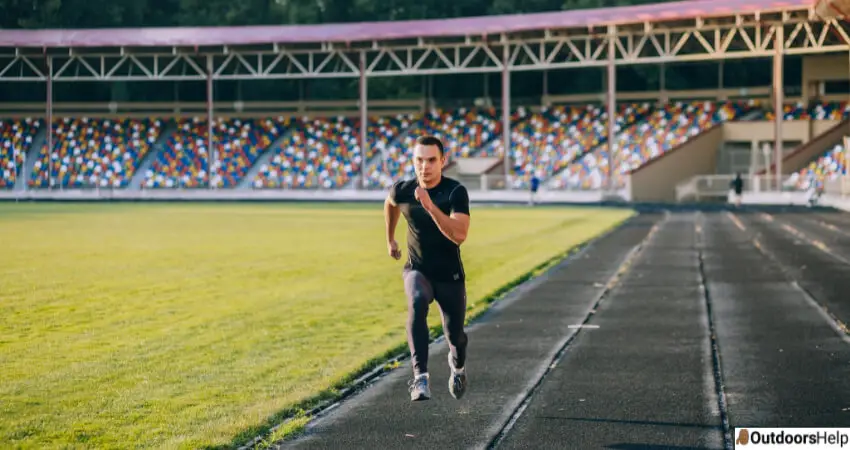Have you ever wondered how fast humans can run? Our bodies have different capabilities, mainly regarding physical features such as Usain Bolt and Eddie Hall. These runners have shown impressive accomplishment by running at speeds greater than 20 miles per hour. However, how fast do people without training capabilities run since they do not have the genetic makeup of world champions? It is hard to give comprehensive feedback regarding the question ‘what is the average running speed of a human’ because your gender may greatly influence your overall performance as a runner.
Nonetheless, a RunRepeat study based on more than 34 million races shows that the average running time is 35 minutes for a 5K and one hour and two minutes for a 10k. We also take two and a half hours and 14 minutes to run a half-marathon and four hours 26 minutes for a full marathon. These numbers may differ based on individual studies.
The maximum running speed of humans is based mainly on speculations since Usain Bolt is the world’s fastest runner, and we can all assume that his 28 miles per hour top speed is as fast as we can go until someone breaks that record. Nonetheless, according to some scientists, humans are capable of running at 40 miles per hour speed. Other scientists believe that humans can only get faster if they start running on all fours, although this may take much practice and time. Below is a chart of human’s average running speed.
A Chart Of Average Human Running Speed Give In Distance Per Gender
| Sex | Race distance | Average pace per mile (1.6 km) |
| male | 5km | 10:18:10 |
| female | 5km | 12:11:10 |
| male | 10km | 8:41:43 |
| female | 10km | 10:02:05 |
| male | half-marathon (13.1 miles) | 9:38:59 |
| female | half-marathon (13.1) miles | 10:58:33 |
| male | marathon (26.2 miles) | 9:28:14 |
| female | marathon (26.2 miles) | 10:23:00 |
Factors Affecting Our Average Running Speed

Runners’ overall performance may be influenced by gender, age, stride length, fluid imbalance, and environment.
1. Age
People assume that as we get older, our average running speed significantly decreases. But according to recent studies, this is not the case. The average long-distance running rate of men aged 40-95 gradually decreased with age, and their performance was not hindered as they aged.
Instead, this study showed that keeping in shape and staying injury-free will help you to slow down much later in your mid-thirties. This study’s research stated that 40 is the age at which fitness starts to decline. This theory of aging can also be applied to the average speed of running for female runners. Age and gender show minor alterations in your overall performance when analyzing the average running rate of humans. Nonetheless, you should know that these factors are nominal and may not hinder a runner in the immediate future.
2. Stride Length And Running Cadence
Running cadence is the number of steps a runner takes as they exercise, and the stride length is the distance the leg stretches. Multiplying these factors will give you a mathematically accurate description of running speed. If you improve cadence and stride length while the other one remains constant, your average running speed in mph will increase. As a runner, you have significant influence over this area, which may benefit your training if you improve one of these areas.
3. Fluid Imbalance And Dehydration
It is important to note that your daily intake of liquids may affect your average running speed. If you are dehydrated, you may feel fatigued when running. Fluid imbalance within your body can also hinder your average running speed since it needs fluids to flow throughout for optimum running performance.
Usually, fluid imbalance occurs when we sweat and lose a significant part of our daily liquid intake. To avoid such a scenario, you need to drink plenty of liquids before running. You may also use hydration tablets to reduce the impact of the lost fluids. Reducing the levels of lost fluids significantly affects your average running speed.
4. Environment
The environment in which a runner run affects their average running speed significantly. Running in extreme conditions, for instance, when it’s snowing or the sun is scorching, makes the body respond accordingly and react to what you are putting it through. The body may respond by slowing down your overall pace when it cannot cope with the strain, which automatically decreases your average running speed. You should ensure that you run when the weather is appropriate or dress appropriately during extreme weather conditions.
Tips To Increase Your Average Running Speed

Getting fit and improving your running speed requires you to focus on building up gradually over some weeks. You can also apply some of the tips mentioned below.
1. Start living a healthy life and focus on your eating habits and get plenty of fluids and sleep well.
2. Start a race by warming up for about 10 to 15 minutes and finish with a cooldown.
3. Work on improving your endurance and speed by interval training while also switching it up with treadmill running and trail running.
4. Come up with a timetable for your workouts and balance the running routine with strength training and plenty of stretches for keeping the body loose and flexible.
5. Increase your endurance and muscle mass, and in return, you will build your speed. Your workouts should vary between moderate and high-intensity exercises with other forms of endurance activities like swimming and biking.
6. Ensure that you get plenty of rest at least one day a week.
7. If you are a beginner, start by running for 20 to 30 minutes and slowly increase your durations as you warm down to the exercise to reduce the risk of injuries.
Conclusion
How fast a person can run depends on various factors, including fitness level and genetics. The level of fitness plays a massive role in how fast you can run more than your age or sex because we need the endurance to complete a run. The speed you run also depends on your pace and the total distance you want to complete.

